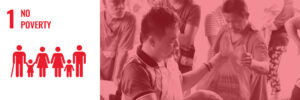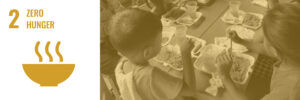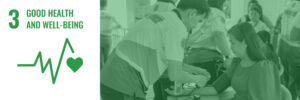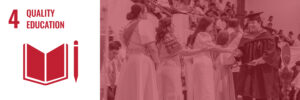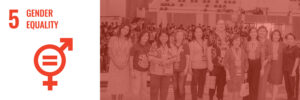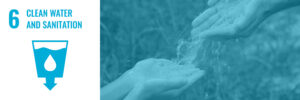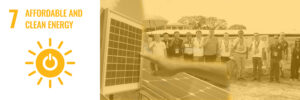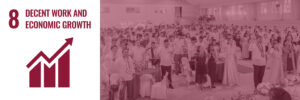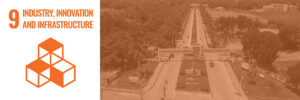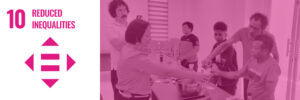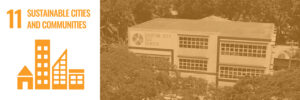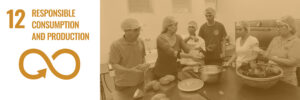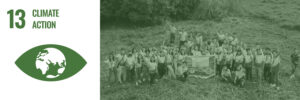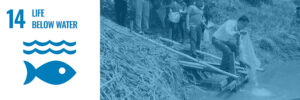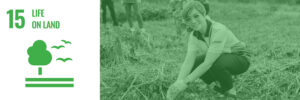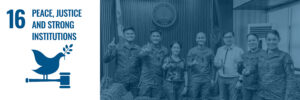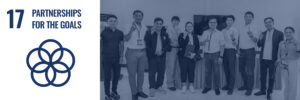2023 – Research | SDG 17 – Partnerships for the Goals
Technical Research Category
Upscaling of Postharvest Processing and Shelf-Life of Oyster Mushroom: Processing of Mushroom Steamed Dumpling
Proponents: Norvelyn B. Bautista, Ma. Leonila G. Cabaccan
Abstract
This study presents the results of a sensory evaluation conducted to assess the attributes of oyster mushroom gyoza, with participation from 50 evaluators. The gyoza were evaluated based on five sensory attributes: appearance, aroma, texture, taste/flavor, and general acceptability, using a 1-9 hedonic scale where 1 indicates “dislike extremely” and 9 indicates “like extremely.” The results demonstrated that the gyoza had a mean appearance score of 7.6, indicating favorable visual appeal. Aroma received a mean score of 7.2, suggesting general appreciation but less impact on the overall experience. The texture was highly rated with a mean of 7.8, showcasing a successful combination of the soft wrapper and tender filling. The taste/flavor emerged as the standout attribute, achieving a mean score of 8.3, reflecting strong satisfaction attributed to the umami-rich filling of the oyster mushrooms. The overall acceptability score of 8.0 confirmed that the gyoza were well-liked by the evaluators. The findings highlight the strong visual appeal, favorable texture, and particularly satisfying flavor of the oyster mushroom gyoza, establishing them as a successful plant-based alternative to traditional meat-filled dumplings.
Social Research Category
Closer Look to Explore the Knowledge, Skills & Attitude (KSA) on the Faculty Community Engagement of the College of Business, Accountancy & Public Administration (CBAPA) Isabela State University (ISU) Echague, Isabela
Study 2: Core and Soft Skills
Proponents: Amie G. Bala, MBA, Ralliegh F. Vizcarra, RMT, Ph.D., DBA, DPA
Abstract
This study explores the role of core and soft skills in enhancing the community engagement of faculty members at the College of Business, Accountancy, and Public Administration (CBAPA) at Isabela State University (ISU). Faculty involvement in extension activities is crucial in bridging academic knowledge and local community needs. However, there is a gap in understanding the competencies that contribute to impactful community engagements. This research evaluates the proficiency of CBAPA faculty in critical knowledge areas such as communication, people management, and problem-solving which are vital for successful community outreach. Utilizing a mixed-method approach, the study assesses the faculty’s motivation, collaboration efforts, and institutional support to develop a conceptual framework aimed at fostering sustained and meaningful community involvement. Findings suggest that while faculty members demonstrate strong communication and collaboration skills, there is room for improvement in technological proficiency and problem-solving. The study underscores the need for targeted faculty development programs to enhance both core and soft skills, thereby promoting a more structured and effective approach to community engagement. The outcomes provide insights into designing professional development initiatives that align faculty competencies with the demands of community extension activities.
Closer Look to Explore the Knowledge, Skills & Attitude (KSA) on the Faculty Community Engagement of the College of Business, Accountancy & Public Administration (CBAPA) Isabela State University (ISU) Echague, Isabela Study
Study 3: Attitudinal Traits, Challenges and Supports
Proponents: Amie G. Bala, MBA, Ralliegh F. Vizcarra, RMT, Ph.D., DBA, DPA
Abstract
Community engagement is a critical aspect of higher education, facilitating the connection between academic institutions and their surrounding communities. This study aims to develop a comprehensive framework that examines the attitudinal traits, challenges, and support systems influencing the effectiveness of faculty extensionists at the College of Business, Accountancy, and Public Administration (CBAPA) of Isabela State University (ISU). Key attitudinal traits such as adaptability, collaboration, and accountability were explored alongside challenges like resource limitations, bureaucratic barriers, and post- pandemic restrictions. The study utilized a mixed-method approach, incorporating structured questionnaires and thematic analysis to assess faculty experiences and the support mechanisms available for community engagement. Results highlight the importance of internal and external linkages, as well as institutional support in enhancing faculty efforts. By identifying the traits, challenges, and support systems that shape faculty extensionists’ experiences, this research provides valuable insights into improving community engagement practices within academic settings.
More than ISU CBAPA’S KSA? Designing Faculty Researchers’ Quality Professional Development Prospective Framework for Sustainable Improvement in Research Engagement
Study 1: Knowledge of Institutional Research Ecosystem
Proponent: Ralliegh F. Vizcarra, RMT, Ph.D., DBA, DPA
Abstract
This study investigates the factors influencing research engagement among faculty members at the College of Business, Accountancy, and Public Administration (CBAPA) at Isabela State University (ISU). It highlights the significance of faculty involvement in research for professional development and improved educational quality. Utilizing a mixed-methods approach, the research identifies critical knowledge areas necessary for effective research practices, including critical thinking, diverse methodologies, and grant writing skills. Participants reported limited awareness of institutional resources and funding opportunities, indicating a pressing need for enhanced communication and support. The findings reveal that only 28.4% of faculty were fully aware of available institutional resources, underscoring gaps in knowledge that hinder research productivity. The study proposes a framework aimed at fostering a strong research culture within CBAPA, emphasizing the integration of teaching and research as essential for academic excellence. By addressing these gaps through targeted outreach and training initiatives, the institution can empower faculty researchers to maximize their potential, ultimately contributing to sustainable growth and enhanced academic standing.
More than ISU CBAPA’S KSA? Designing Faculty Researchers’ Quality Professional Development Prospective Framework for Sustainable Improvement in Research Engagement,
Study 2: Research Core Knowledge, Technical and Soft Skills
Proponent: Ralliegh F. Vizcarra, RMT, Ph.D., DBA, DPA
Abstract
This study explores the critical need for a structured professional development (PD) framework aimed at enhancing the core knowledge, technical skills, and soft skills of faculty researchers at Isabela State University College of Business, Agriculture, and Public Administration (ISU CBAPA). Findings reveal that while faculty members possess moderate knowledge of research methods, significant gaps exist in areas such as data collection, ethical practices, data analysis techniques, and publishing strategies. The research emphasizes the importance of integrating both technical and soft skills in PD initiatives to foster a culture of research excellence. By employing a mixed-methods approach, including qualitative descriptive and thematic analysis, the study identifies key areas for improvement and proposes targeted training programs to enhance faculty competencies. Ultimately, investing in comprehensive PD initiatives is essential for empowering faculty to conduct high-quality research and effectively disseminate their findings. This aligns with existing literature that underscores the positive impact of holistic faculty development on research engagement and productivity. The proposed framework aims to cultivate a stronger academic culture at ISU CBAPA, thereby enhancing the overall impact of scholarly contributions.
More than ISU CBAPA’S KSA? Designing Faculty Researchers’ Quality Professional Development Prospective Framework for Sustainable Improvement in Research Engagement
Study 1: Knowledge of Institutional Research Ecosystem, Attitudinal Traits, Institutional Supports & Challenges
Proponents: Ralliegh F. Vizcarra, RMT, Ph.D., DBA, DPA, Leah B. Bitao, MBA, Jessica C. Managuelod, MPA, DPA, Jeannette Gonzales, CPA, PhD
Abstract
This descriptive study aimed to assess the impact of extension activities and the challenges encountered by the community extension providers in the implementation of the approved extension activities in the College of Education at Isabela State University – Echague Campus. Frequency counts and percentages were used. The mean, on the other hand, was also used to determine the impact of extension activities. Results revealed that positive perceptions of extension activities among respondents, emphasizing their role in social and economic development. While challenges exist, particularly in optimizing training times and addressing occasional weather disruptions, the overall implementation of extension programs is effective. Strategic improvements in training, communication, and adaptive management practices are recommended to further enhance program impact and sustainability. The study recommends that the existing college extension training activities may be continued and further enhanced taking into considerations the assessment made on various criteria that were identified.
Faculty of the college of Education are encouraged to continue their best practices in terms of planning, disseminating and Monitoring and evaluation of the approved extension activities. Problems that were encountered such as time allocation in the conduct of extension activities and the use of their own materials or equipments during return demonstration as well as difficulty in the consolidation of reports need to be addressed immediately in order to come up with a more responsive extension training activity. Though there are other problems that were “rarely” encountered by the clientele these need not be neglected rather course of actions or interventions need to be addressed. The college extension unit may request assistance from the university for the provision of vehicle in going to the adopted barangay or school when conducting extension activities.
Technological Research Category
Extension
DEKADANG TULONG-DUNONG SA MGA ISABELINO: CS ELIGIBLES NGAYON, CIVIL SERVANTS NG BAYAN BUKAS
Proponent: Marvin Cabantac
Tulong-Dunong sa Kawaning Gobyerno at Kabataan is an extension program of the School of Arts and Sciences at Isabela State University (ISU) Cauayan City Campus. This initiative, in partnership with the Local Government of Cauayan City, the Municipality of Burgos, Isabela, and Alicia Water District, was established to support Bachelor of Arts students in preparing for the annual Civil Service Commission’s Career Service Eligibility Examination, both Professional and Sub-Professional levels.
The program has expanded to include local government employees and personnel from other government-owned and controlled corporations (GOCCs) who aspire to pass the Civil Service Examination (CSE). The review sessions involve both pre- and post-testing on key areas, including Numerical Ability, Verbal Ability, Logical and Reasoning Ability, and General Information, with a focus on the Philippine Constitution.
A team of expert lecturers leads the program, drawing from the faculty of the School of Arts and Sciences, the College of Education, and successful alumni who are certified Career Service Eligibles and Licensed Professional Teachers. Since 2013, successful participants have gone on to serve in various government agencies, benefiting from the security of tenure that comes with being a Career Service Eligible. Alumni of the program now work in diverse roles, including as lawyers, law enforcers, and government employees, contributing meaningfully across different levels of public service.
The program has not only helped improve career opportunities but also uplifted the lives of its participants. The sustained success of Tulong-Dunong sa Kawaning Gobyerno at Kabataan has made a significant impact in the community, empowering individuals to serve the nation as committed civil servants.
EDUCATIONAL LITERACY CAPABILITY BUILDING FOR SECONDARY SCHOOL IN SAN MARIANO, ISABELA
Proponents: Aisie O. Bete- Liban, Apol Joy D. Cagayan, Elizabeth C. Barrera, Grace D. Yanos, Kristopher R. Lopez, Arnie T. Antonio, Rockangel Jamoral, Jaypee A. Zipagan
The educational literacy capability program for secondary school was conducted by the faculty of the Bachelor of Secondary Education Program of ISU San Mariano Campus in partnership with the faculty and students of Daragutan East National High School (DENHS) located at Daragutan East, San Mariano, Isabela. The aim of this extension program is to conduct training and provide knowledge and skills necessary in utilizing the latest educational tools in teaching and learning practices, technical and communication skills needed in enhancing the school publication, and increase participants’ research involvement. There were 62 students and faculty recipients of this program, with 40 females and 22 males. Through series of meetings with partner agency and training conducted, there are 5 conceptualized science investigatory projects presented by the grade 10 students, 3 journalistic writing outputs presented by the student members of school publication and there are 6 conceptualized action research titles presented by the faculty-participants. To ensure continuity of the extension program, the DENHS also assigned a faculty research coordinator, school publication adviser and SIP coordinator to help monitor the participants in continuously working on their outputs. Moreover, an open-line communication was created by the proponents for on-site and online consultations with the participants.
GENDER AND DEVELOPMENT TOWARD GENDER EQUALITY AND WOMEN EMPOWERMENT (PHASE 1)
Proponents: Ruby B. Dimas,Evelyn B. Cristobal, Josiefel Agcaoili, Jerahmeel, Elijah B. Ibale
The program of ISU, San Mariano on Gender and development towards Gender Equality and Women Empowerment is aimed to increase the level of knowledge of its women and men particularly the Gawad Kalinga and 4 P’s Recipients in the adopted barangays of Bitabian, San Mariano, Isabela and Sta. Cruz, Benito Soliven, Isabela. It is focused on Gender Sensitivity:GAD Basic Concepts and its related laws; issues and concerns such as LGBT rights, anti-bullying act, VAWC and values education. Livelihood Enterprise Development Training on Baking and Food processing technologies is also included in the training to augment their income employing different strategies as well as human and material resources. The program is anchored in the attainment of Sustainable Development Goals (SDGs) such as SDG 1, alleviation of poverty and SDG 5 gender equality among the beneficiaries and the community as a whole.
GENDER AND DEVELOPMENT TOWARD GENDER EQUALITY AND WOMEN EMPOWERMENT (PHASE 2)
Proponents: Ruby B. Dimas, Aisie B. Liban, Arnie T. Antonio, Evelyn B, Cristobal, Jaypee A. Zipagan
The extension project of ISU, San Mariano on Gender and development towards Gender Equality and Women Empowerment is aimed to increase the level of knowledge of its women and men particularly the Gawad Kalinga and 4 P’s Recipients in the adopted barangays of Bitabian, San Mariano, Isabela and Sta. Cruz, Benito Soliven, Isabela. It is focused on Gender Sensitivity: GAD Basic Concepts and its related laws; issues and concerns such as LGBT rights, anti-bullying act, VAWC, teenage pregnancy and values education.
As per evaluation made after the conduct of the project, there are favorable results such that: the recipients become gender sensitive individuals of the community, reduced cases of teenage pregnancy, the LGBT group are accepted and respected, reduced incidents on violations against women and their children, internalized the needed values in everyday living.
NEGOSYONG PANGKABUHAYAN TUNGO SA KAUNLARAN (NEPANG) PROJECT
Proponents: Josiefel Z. Agcaoili, Evelyn B. Cristobal, Mary Ann Mamauag,Jose Carlos T. Mamauag, Ronderwin A. Vinasoy
The project Negosyong pangkabuhayan Tungo sa Kaunlaran (NEPANG) is an extension project implemented in the two adopted barangays of the campus. It’s a project implemented by the BSHM/BSHRM Core faculty in collaboration with the BSED program. To fully implement the project, the extensionists used various techniques such that coordination with the Barangay Captains were made prior to the conduct or the project. The initial plans of introducing the project among the participants were implemented as well as distribution of IEC materials were given. Then an intensive training was done highlighting key techniques in producing the products. With a collaborative effort from the extensionists and participants, an evaluation of outstanding was rated to us. The project is timely and relevant because it conforms to various Sustainable Development Goals(SDGs) like SDG1 or No Poverty; SDG2 or Zero Hunger and SDG8, Decent Work. The implementation of entrepreneurial activity targeting development of livelihood enterprises among the participants of the adopted barangays were made possible because of the proponents’ enthusiasm to join in the realization of the SDGs or Sustainable Development Goals that the university wish to attain. Therefore, to have a positive economy where numerous job creation enjoys by the people which output benefits the majority, this Negosyong Pangkabuhayan Tungo sa Kaunlaran (NEPANG) is timely and relevant.
OK SI SK HARNESSING THE POTENTIALS OF SK CHAIRPERSONS IN DIGITAL TECHNOLOGY
Proponents: Heherson B. Albano, Vince Lloyd Q. Balisi, Ivy M. Tarun, Madeline M. Taggueg, Rosemary L. Buraga, Mario T. Umayam, Dominic C. Cabauatan
The ‘OK si SK” project strives to empower Sangguniang Kabataan (SK) Chairperson in Cabagan, Isabela, enhancing their digital skills for community development. In the digital age, proficiency in technology is crucial for young leaders to effectively address constituents’ needs. The project provides training workshops covering photo editing, video editing, and web-based document management for SK Chairpersons barangays in Cabagan. Post-evaluation assesses service delivery and participant improvement . Results reveal positive feedback on content, speakers, coordination and timeliness. Evaluations indicate substantial knowledge and skill enhancements among participants. Acquired skills aim to strengthen SK Chairpersons’ roles in local governance, fostering transparency, accountability, and digital empowerment among Cabagan’s youth leaders. “OK si SK” illustrates how targeted training equips youth leaders with digital proficiencies necessary to champion community concerns effectively. The Projects align with SDG Goals, especially SDG 4 (Quality Education), SDG 11 (Sustainable Cities and Communities), and SDG 17 (Partnerships for the Goals). Ultimately, “OK si SK” s to achieving these SDG Goals by empowering youth leaders to address community challenges using digital tools.
PROJECT EARTH: ENVIRONMENTAL AWARENESS AMONG YOUTH OF SAN MARIANO, ISABELA
Proponents: Apol Joy D. Cagayan, Grace D. Yanos, Aisie Bete-Liban, Joanne Clementine B. Ibale
The Isabela State University – San Mariano Campus, through its extension unit, conducted an extension project entitled Project EARTH: Environmental Awareness among youth of San Mariano, Isabela. The beneficiaries of the said project were the senior high school students of Daragutan East National High School, Daragutan East, San Mariano, Isabela. The project was a year-round extension program which aim is to recognize the importance of promoting environmental awareness and to engage the youth to various environmental activities to have an eco-friendly and sustainable lives in their community. Climate change, environmental concerns, disaster resilience, and sustainable practices like urban gardening and recycling were highlighted. The conducted project fosters a sense of responsibility and concern among young people while also safeguarding the local biodiversity and natural ecosystem. In response to integrating the Sustainable Development Goals (SDGs), the project adopted five (5) SDGs which are the SDG 4: Quality Education, SDG 12: Responsible Consumption and Production, SDG 13: Climate Action, SDG 15: Life on Land and SDG 17: Partnership for the Goals. The project made sure that its effects would last by raising knowledgeable, responsible young people.
PROJECT RED: REDESIGNING WORKFLOW TOWARDS A SUSTAINABLEAND EFFICIENT SCHOOL ECOSYSTEM
Proponent: Rosemary L. Buraga
The project, titled “Redesigning Workflow towards a Sustainable and Efficient School Ecosystem through the Implementation of Network and Grade Reporting Systems with Feedback Mechanisms,” is a comprehensive initiative that profoundly impacts several Sustainable Development Goals (SDGs). By redefining and enhancing the educational landscape of Cabagan Riverside National High School, this project directly addresses or aligns with various key SDGs, which aim to enhance the quality of education by improving access to digital resources, streamlining grading procedures, and empowering teachers with new skills. It also aligns with SDG 9 (Industry, Innovation, and Infrastructure) by establishing a computer network and enhancing network infrastructure. These efforts promote innovation in educational technology and contribute to the development of sustainable and resilient infrastructure. Additionally, it promotes SDG 10 (Reduced Inequalities). Its objective of ensuring equal access to digital resources for all educators works to reduce inequalities within the school community. By bridging the digital divide and providing equal opportunities for all teachers, the project promotes greater inclusivity. In alignment with SDG 17 (Partnerships for the Goals), the project emphasizes collaboration and cooperation by adopting the AIDTech methodology and involving stakeholders. It underscores the importance of partnerships and working together to implement technological solutions for educational enhancement. Moreover, the project indirectly contributes to SDG 3 (good health and well-being) and SDG 11 (sustainable cities and communities). The improved efficiency and workflow of the school ecosystem resulting from the project can lead to reduced stress and better overall well-being for students and teachers. Additionally, efficient systems within the school contribute to creating a more sustainable and conducive learning environment.
PROGRAM/PROJECT TITLE: RESILIENCE-BUILDING AMONG SMALLHOLDER FARMERS OF SELECTED UPLAND FARMING COMMUNITIES IN THE PROVINCE OF ISABELA, PHILIPPINES
The smallholder upland farmers in Isabela, Philippines are one of the most vulnerable sectors to external shocks such as pandemic, climate change and natural calamities, particularly typhoons. As external shocks are inevitable, there is a need to build the resilience of agricultural sector especially in developing nations such as the Philippines particularly the vulnerable farmers in the uplands farming communities in the country through redesigning of their agricultural production systems that are based on the sustainable use of natural resources such as agroforestry system. This proposed capacity development project aims to increase the resilience of vulnerable smallholder farmers in the uplands from critical and pervasive threats of COVID-19 pandemic and natural disasters. There are policy assessments done and proposed specific suggestions for institutionalization of agroforestry in the area. The conduct of multiple trainings such as workshops and training of trainers enhanced and encouraged the farmers to be more engaged with the proposal of the demonstration farms which are now present in certain areas of the upland barangays.
SDG Addressed: SDG 1 – No Poverty; SDG 2 – Zero Hunger; SDG 11- Sustainable Cities and Communities; SDG 13 – Climate Action; SDG 17 – Partnerships for the Goals
6P’s Per Objectives:
This proposed capacity development project aims to increase the resilience of vulnerable smallholder farmers in the uplands from critical and pervasive threats of COVID-19 pandemic and natural disasters. The project specifically aimed to:
- build the knowledge and skills of upland smallholder farmers, farmer organizations, and local government units in the design and establishment of appropriate agroforestry systems in their local communities (People Services, Places and Partnerships) ;
- utilize and strengthen the resources and capacity of local multi-stakeholders respectively, for collaborative resilience-building projects (People Services, Places and Partnerships) ; and
- formulate policy recommendations for institutionalization of adaptive and resilience-building programs (Policies, Publication)

